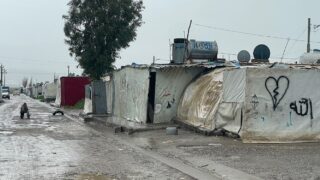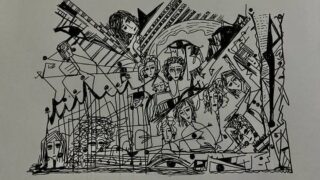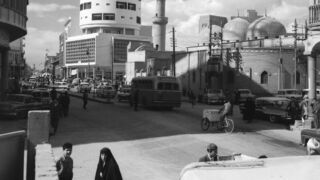This article originally appeared in LeftEast on June 13, 2023. It is republished here with the permission of the author and LeftEast.
The night’s last cigarette dies on the asphalt. Here, at a monument memorializing a Marine Corps triumph over my ancestors, I trek to a thicket of trees, retreat to the folds of darkness, and see the nightlights of Washington DC dance to my solitude in the distance.
A vista unlike that monotonous cityscape of Baghdad: bereft of its palm trees, cloaked in an air of poison with a bombed-out tower hovering over a dying Tigris River like a watchful corpse.
It’s been two decades since war limped its way to the familiar gates of Iraq, its afterlives remain embroidered with the very fabric of our own. I think of what has become of my hometown of Baghdad tonight.
After a short trip to New York, “the last Iraqi communist” Saadi Youssef penned a poem on the irreversible insult inflicted on the lives, psyche, bodies and land of the barbarians overseas:
When you take a cab today to the airport
Do not, quietly, say goodbye
Don’t say anything
To the country that bequeathed madness to you,
The country that demolished a homeland over your head
and hired death squads
and uprooted the meaning of branches
from your garden.
I hear him reciting the words tonight, as I drift from this walkway in a DC park to a mental non-place overlooking the ruins of Baghdad, the site of my earliest memories and America’s imperial experimentations.
I have been in the United States for two years now, having landed in August 2021, barely five days after my mother’s passing in Baghdad, to finish my graduate study at Georgetown University.
In the Beltway, a whiff of impropriety (to borrow the words of Yael Navaro) for harms inflicted overseas prevails, albeit faraway from the ruins left in theaters of operations.(1)
I sense it, as I walk this usurped native land on the periphery of a society atomized and dismembered.
From one metro station to the next, and up an escalator aching beneath the sins of us passing through, I prowl sidewalks reeking of urine and weed by night, slipping past makeshift encampments where the homeless hallucinate, lament demons I cannot see, and later die.
“If one wishes to inform oneself about a country,” Charles Simic would say, “there is no better way than roaming one of its cities and seeing how the rich and the destitute live.”
No undercover investigator of the city is better known than the flâneur. The nineteenth century Parisian idler Charles Baudelaire conceived and later Walter Benjamin popularized was “as much at home among the façades of houses as a citizen is in his four walls.”(2)
But the flâneur was also nicely dressed and after his comfort. As society panted after modernity, in the arcades he demanded his elbow room and was “unwilling to forgo the life of a gentleman of leisure.”(3)
His presence was a sign of “the alienation of the city and of capitalism.”(4)
Before the marvels offered in store windows, he was distracted, intoxicated by the spell of commodity fetishism, that sex appeal of the inorganic.(5) In the supermarket, he zigzagged a labyrinth of merchandise as he once went botanizing on the streets.(6)
“If in the beginning the street had become an intérieur for him, now this intérieur turned into a street.”(7) Never a stomping ground of my own, the department store was the flâneur’s last hangout, where he met his fate in the triumph of consumerism.(8)
This spectacle, its incarnations in advertisement or entertainment consumption, Guy Debord later wrote, “is able to subject human beings to itself because the economy has already totally subjugated them.”(9)
In mid-twentieth century Paris, Debord and his situationist comrades rebelled against the capitalist spectacle. They roved on what Debord calls a dérive, drifting with an “awareness of [the] psychogeographical effects [of the city].”(10)
They went “slipping by night into houses undergoing demolition, hitchhiking nonstop and without destination through Paris during a transportation strike in the name of adding to the confusion, wandering in subterranean catacombs forbidden to the public.”(11)
In Baghdad, the story was different.
Roaming the Ruins
Unlike Paris, my stage set was menacing, securitized, inscribed with war’s indelible insignia. A different spectacle hovers over the life of the Iraqi, threatening looks from dead and living militiamen assail her psyche from billboards under which war orphans beg and plead.(12)
My alienation differed from that of the flâneur. In an Iraq bombed into a liberated market-economy, my walks were not a symptom of the hypnotizing effects of consumerism.
In the definition of Maria Tumarkin, Baghdad is a traumascape, a place haunted and haunting, “transformed physically and psychically by suffering.”(13)
Not only did war leave its scars on the landscape, years of inter/intra-sectarian armed groups fighting left countless houses locked and abandoned, its residents dead, exiled or – as with the case of my own family – forcibly displaced.
Their boarded-up windows and unkempt gardens, the cars left in driveways to die behind pockmarked low brick fences were black banners once hung for the murdered, all testify to unremedied wounds inflicted on the city and its people.
In my outings, I would be received by cannibalized alleys of mute architecture from which the ghosts of yesteryear screamed at me in the dark. The streets were alive, themselves hissing, dwelled not only by the living but also the dead.
Haunting, Avery F. Gordon writes, is “an animated state in which a repressed or unresolved social violence is making itself known.”(14) It raises specters that demand not tears, but a something-to-be-done. But what could I do?
From Abu Nawas to al-Rashid Street, I walked at a leisurely pace, but always writing with a Benjaminian urgency “to seize hold of a memory as it flashes up at a moment of danger,” when imperial and state histories alter and erase my own.(15)
In the presence of audacious imperial denial, a banalization of our agony in the international press, a normalization of an abnormal situation by a violating system-in-violation seen as the occupation’s bastard child by the violated – I had a duty to walk, witness, and write.
I also walked to converse with a city (as Sinan Antoon did before me) in whose bosom I grew up not knowing her, at times feeling exiled. After 2003, each of Baghdad’s streets would lead to overcrowded cemeteries. As Naomi Klein puts it, for many years Iraqis would “walk the streets wide open to any possible violence.”(16)
To go on dérive in a topography amputated by slithering borders of endless concrete meant surrendering oneself to warring armed groups à la Jayish al-Mahdi and al-Qaida, to perish in a moment of ephemeral mayhem at the site of the next bombing.
My father, himself abducted and held at gunpoint after 2003, would ensure our main gate is chained and locked as early as four in the afternoon. By nightfall, only death’s messengers, US troops and rabid dogs full on rotten human flesh dwelled the darkened streets.
By the time I became a journalist and started roaming the ruins, the urban sphere was increasingly securitized, a sign of persistent insecurity and a desperate attempt to enact a state eroded from the inside by the corrupt and lacking legitimacy on the streets.
Notwithstanding the whimsical coercion I encountered at checkpoints in Baghdad, by day or by night, in recent years I ambled where and when someone with a camera hanging from his neck was out of place.
I would be stopped, questioned, dragged by the arm for interrogation in the open. In other words, I would be violated. But the solitary walker, Will Self writes, is “an insurgent against the contemporary world, an ambulatory time traveler.”(17)
Here/There
In Washington DC, the raison d’etre of my walks is modest. At times, I need to reach a point in my mental map farthest from the dogs of my trauma.
Come evening, they bark inside my head, drowning the sound of my mother’s voice, frightened, besieged with a butterfly between a howling siren and an astray bullet:
Ya youma!
Ya youma!
My mother’s voice arrives unexpected, here, on foreign sidewalk many years and thousands of miles away, and I am off balance, momentarily blinded in the surge of the crowd.
I made my way to the Iowa Jima memorial tonight after a recent visit by an old Iraqi friend from Texas unsettled the monotony of my solitary life. We reminisced about a now-moribund Baghdad and cursed the goddamn time that handed Iraq over to a mob of neo-literate crooks.
By the time he left, I walked to the nearby gardens surrounding the war memorial to mend a few wounds in silence. And here comes a child in the company of a young couple, forcing me back to a mental path winding into the dangerous territories of memory.
As she walks, her shoes send colorful lights pulsating in the dark. Suddenly, my steps awaken a familiar resonance, the walkway is precipitous, “leading downward into a past of childhood.”(18)
In an instant, I am transplanted to the corridors of my high school in Baghdad. It is deserted. Its doors unhinged, its windowpanes shattered. Its walls, as I remember them, massacred by bullets.
Once a den for resistance fighters and later terrorists from which they ravaged US troops and equally terrorist contractor convoys cruising down the adjacent highway, my high school complex is a site of ruins.
Walking in Baghdad, I would halt before disemboweled bridges, massacred lampposts, and shredded road signs telling of directions and violent histories. I would be struck by a spell cast by emptied homes with a radiant presence of absent lives.
In ruins, mute architecture could speak. My urban environment discharged what Navaro would describe as an affect of melancholy on me.(19)
But ruins, Ann Laura Stoler tells us, are not only the decayed matter. We need to heed the signs of the less perceptible. There are “protracted imperial processes that saturate the subsoil of people’s lives and persist, sometimes subjacently, over a longer durée.”(20)
In the soil of Iraq, particles of the tons of depleted uranium continue to live, contaminate, and kill. Faraway from hospital wards where babies are born dead in Fallujah, the system-in-violation and its entrenched militiamen aspire to run a police state in Baghdad.
The Rot in the Deep
Not so long ago, authorities rounded up social media users for what is “reported” as indecent content. In the oasis of democracy that is Iraq’s Kurdistan, journalists are regularly “detained and attacked.”
A Washington Post report documented torture and sexual abuse inflicted on corruption suspects in former Prime Minister Mustafa al-Kadhimi’s time. When meted out to those suspected of having ties to terrorist groups, a source in Baghdad assured me that the torture continues today.
Law No.111 in Iraq: Speaking Up is a Crime!
31-03-2023
An officer once described to me in an artist’s obsession how confessions are properly extracted from uncooperative suspects: “I tied his penis with a thread until he begged me to let him urinate.” His eyes glittered as he recounted in meticulous detail his modus operandi.
The suspect confessed, but how many innocents are there in the bowels of state’s prisons or at the mercy of its militiamen?
As environmental degradation drives rural communities to urban margins and instigates conflicts over scarce waters, activists, my friend Safaa Khalaf writes, are haunted by “attempts to silence them, including through kidnapping, arrest, threats of imprisonment, and arbitrary prosecution.”
As farcical as it sounds, in campaigns to safeguard the nation from the specter of Saddam Hussein, the Hashd Sha`abi amalgamation of militiamen rounds up alleged Ba`ath Party affiliates at will, sending fear waves reverberating through the masses.
To the horror of a bewildered population, the security apparatus, writes a local reporter, exhibits pixelated faces of captured “suspects” photographed even before due legal processes take place.
I asked Dr. Ali al-Bayati about this. As a human rights advocate, al-Bayati is a routine target at the receiving end of the state’s systematic abuse of democratic rights it ostensibly sanctifies.
In exhibiting suspects’ faces on social media, he tells me, there is a violation of one’s dignity, an indifference to their mental wellbeing. “Law enforcement [in Iraq] operates in a chaotic manner, in complete detachment from the constitution, the law, and the principles of human rights.”
These imitators of Hussein’s ruthless Ba`athists are up to something else.
This is the inescapable threat of justice Benjamin alludes to in his Critique of Violence. The photographed and appropriated faces (as Susan Sontag puts it) are a sign of what the state can and will do to those dissatisfied with (and because of) its lethal failings.(21)
In lawlessness, in a realm of worn sovereignty, a daily dose of multifaceted violence is a corollary.
“Lawmaking,” Benjamin writes, “is powermaking, assumption of power, and to the extent an immediate manifestation of violence.”(22) The mangled terrorists’ corpses the state dumps on social media serve the same purpose.
For the traumatized Iraqi, sifting through social media dumpsters past exotifying posts of diaspora influencers becomes as risky as loitering on the sidewalks of Baghdad or revisiting the sites of memory.(23) The truth is, this is a country where corpses are still dumped on the streets.
In this deceitful Benjaminian progress towards a stability undisturbed by terrorism, in the mere rule of the infamous who share a cross-sectarian camaraderie in theft, there is what Stoler calls an active, ongoing process of ruination that assails and assaults the citizenry.(24)
Tourism
Many foreign reporters choose to act like tourists, looking for the “positive” version of the story.
A story by a new, lost bureau chief at Reuters describes how Mohammed al-Sudani’s Coordination Framework government, itself a testament to the irreversibility of Iraq’s undoing, placates the population with fresh tarmac roads and neat pavements.
Baghdad, Reuters claims, is receiving a “make-over” local reporters have their own, different say about. In Jummar, Ihab Shgheidil’s story carries a title that parodies these projects.
The latter conveys a common skepticism of al-Sudani’s Reuters-celebrated “achievements” – a series of still-incomplete projects some of which inherited from his predecessor.
Performing cosmetic operations on a dying body is far from having the impact of domesticating a bruised population whose frequent uprisings have evinced, again and again, their rejection of those rotating in positions of power.
The allure of the cosmetic, however, seems hard to escape. A cliché photograph of the picturesque al-Mutanabbi Street illuminated at night accompanies the Reuters story. It is the “the largest effort to refurbish Baghdad since the 2003 U.S. invasion,” heralds the caption.
Al-Mutanabbi is a side-street of many book stores branching off al-Rashid, the once elegant hangout of Baghdad’s intelligentsia and a site of legendary protests led by the left. In my walks, I often visited its cafés for a sip of chai noomi basra, the dried lime tea much loved in Iraq.
Take any left or right, misery will welcome you with open arms.
In rotten alleys linking its run-down vicinity to al-Rashid and the nearby squares of al-Maidan and al-Rusafi, limping veterans sell water no one wants to buy, child workers beg in the sun, emaciated dogs rummage through garbage as homeless men dive to their waits in the dumpsters.
The naiveté and pompous claims in illustrious publications are denuded by the decay of al-Bataween and wretched alleys not far from the ghetto where tourists of dubious qualifications populate the bureaus of the international press.
Condemned to a lifetime in limbo, countless Baghdadis have lost not only what Henri Lefebvre calls the right to the city – that right has long been stolen.
Crisscrossing the cobwebs of the godforsaken downtown, I learned from porters who pull back-breaking cargo through a maze of souqs how policemen hunt them for bribes or else impede their mobility.
In Baghdad, workers lose even the choice to beg and vend on the margins without being chased and bashed and their impoverishment securitized by authorities.
Still, Reuters reporters tell us, there is an “optimism” in the air.
I sense no optimism in the voices of family and friends in Iraq. Collective despair prevails on the surface, rage seethes in the deep. In the spirit of the October Uprising of 2019, wounded communities continue to protest across the country.
This June, for instance, protests erupted in the North when people in the margins of Erbil found no running water in the backwater and now-“modern” city of gated-communities and rooftop bars that cater for rich, foreign humanitarians, fashion influencers and tamed yes-men scribes. In foreign reporters’ postcards there is a banalization of Iraqis’ agony, a mockery of their intelligence, a minimization of their grievances to corruption and poor services.
If there is “stability” in Iraq, why is it, then, that social media star reporters still hide in a ghetto behind the concrete barriers of a side street astride Baghdad’s Abu Nawas that is inaccessible to locals, themselves contributing to the disfigurement of the city they romanticize?
Enter Mediocrity
As we marked twenty years since the invasion of Iraq in March, I was livid (but not surprised) at the absurdity of my “colleagues” from the US.
Someone from NBC filmed himself at a Baghdad restaurant jabbering like a clown about Iraqis enjoying “the new security that they have here.”
A random hotshot from The New York Times told her misled readers how we are a “freer society” undergone a neoconservative modernization, bombed from the darkness into the light by America’s missionaries.
Alas, mister George W. Bush is tormented, Lulu Garcia-Navarro likes to think, by all that is lost in a war the remembrance of which necessitates unasked-for takes from members of her breed.
Meanwhile, a horde of diaspora “scholars” from Washington DC to London are committed participants in the normalization of the abnormal and the concealment of ruination.
The list of pampered, jump-in “experts” who blabber over us about democratization and reform is long. In conferences and TV programs marking the war in the Global North, they posed as the sole spokespersons for Iraqis of the inside. The latter need to be spoken for by the Western-bred.
But set these “native experts” loose in Bab al-Sheikh without a guide and they are reported missing. After all, in Baghdad they are more comfortable by the pool at Babylon Rotana than the alleys of the downtrodden. They hardly speak any fusha and most never pen a piece in Arabic. Their interlocutors are not us, but the club of the region’s “experts,” the elite politician and the Western diplomat.
In fortified embassies whose concrete fortifications scar our neighborhoods, the latter interrogate locals for unattainable visas to keep Europe clean. “It is humiliating,” someone recently told me of their experience applying for a pass to heaven.
Then there are the posh fora where the pontificates congregate.
In the Suli Forum at the American University in Sulaimaniyah, characters of Meghan O`Sullivan’s ilk (an aide to war criminal George W. Bush during the years of occupation) were in the esteemed milieu of these diaspora scholars.
In 2018, O`Sullivan celebrated former Prime Minister Adel Abdul Mahdi’s ascension as “a great day for Iraq.” Abdul Mahdi would oversee the murder of hundreds of protesters starting 2019. Undoubtedly, her prescience was needed at the forum.
Critical or not, panelists’ broad conversations on corruption at these fora recycle today’s politicians as recipients of critique (always from abroad, the domestic is criminalized), patrons of reform who retain a will to correct yesterday’s miscalculations.
Some of these characters casually participated in the Iraq Forum, where Qais al-Khazali, a militiaman designated as a terrorist by the US Empire and feared by locals, spoke pearls.
“What message does this send,” a fuming US commentator told Fox after Ambassador Alina Romanowski attended the Iraq Forum, “to U.S. soldiers who fought against these groups, who have had their friends killed or wounded?”
To this self-righteous imperial servant, civilian Iraqis are not an afterthought. But wasn’t it the US Empire that gifted Iraqis cutthroats, ample death and a new branch of Cinnabon to celebrate?
The reigning (dis)order has on its hand the blood of hundreds of us who participated in the October Uprising of 2019, each one of them dies a second time at the sight of mediocrity on display in Iraq.
I think of them tonight, I think of the academics who treat Iraq as a day job, feeling no moral obligation to raise adequate hell in the face of audacity.
Twenty years lingering in a doomed existence, from the shade of damp alleys they will come, the insulted and the laughed at, they will knock down the stage altogether and let the people sing.
1- Yael Navaro-Yashin, The Make-Believe Space: Affective Geography in a Postwar Polity (Durham, NC: Duke University Press, 2012), 167.
2- Walter Benjamin, Charles Baudelaire: A Lyric Poet in the Era of High Capitalism, trans. Harry Zohn, Verso Classics 7 (London New York: Verso, 1997), 37.
3- Benjamin, 54.
4- Gregory Shaya, “The Flâneur, the Badaud, and the Making of a Mass Public in France, circa 1860–1910,” The American Historical Review, February 2004, 41, https://doi.org/10.1086/ahr/109.1.41.
5- Walter Benjamin and Rolf Tiedemann, The Arcades Project (Cambridge, Mass: Belknap Press, 1999), 8.
6- Benjamin, Charles Baudelaire, 54.
7- Benjamin, 54.
8- Shaya, “The Flâneur, the Badaud, and the Making of a Mass Public in France, circa 1860–1910,” 47; Benjamin, Charles Baudelaire, 54.
9- Guy Debord, The Society of the Spectacle, Paperbound edition (Berkeley, CA: Bureau of Public Secrets, 2013), 5.
10- Libero Andreotti and Xavier Costa, Theory of the Dérive and Other Situationist Writings on the City (Barcelona: Museu d’Art Contemporani de Barcelona, 1996), 22.
11- Andreotti and Costa, 26.
12- Here, I think with Benjamin and his words on advertisement in Walter Benjamin et al., One-Way Street (Cambridge, Massachusetts: Belknap Press of Harvard University Press, 2016).
13- Maria M. Tumarkin, Traumascapes: The Power and Fate of Places Transformed by Tragedy (Carlton, Vic: Melbourne University Publishing, 2005), 19.
14- Avery F. Gordon, “Some Thoughts on Haunting and Futurity,” Borderlands 10, no. 2 (2011): 2.
15- Walter Benjamin, Harry Zohn, and Hannah Arendt, Illuminations: Essays and Reflections (Boston ; New York: Mariner Books, Houghton Mifflin Harcourt, 2019), 198.
16- Naomi Klein, The Shock Doctrine: The Rise of Disaster Capitalism, 1st ed (New York: Metropolitan Books/Henry Holt, 2007), 414.
17- Will Self and Ralph Steadman, Psychogeography: Disentangling the Modern Conundrum of Psyche and Place, 1st U.S. ed (New York: Bloomsbury, 2007), 15.
18- Benjamin and Tiedemann, The Arcades Project, 416.
19- Navaro-Yashin, The Make-Believe Space, 172.
20- Ann Laura Stoler, Duress: Imperial Durabilities in Our Times (Durham: Duke University Press, 2016), 343.
21- Susan Sontag, On Photography, 3. printing, A Delta Book (New York, NY: Dell Publ, 1978), 4.
22- Walter Benjamin and Peter Demetz, Reflections: Essays, Aphorisms, Autobiographical Writings, 1st ed (New York: Harcourt Brace Jovanovich, 1978), 295.
23- Here, I think with Antoon’s words on watching TV in Sinan Antoon, “A Barbarian in Rome,” Jadaliyya, March 20, 2012, https://www.jadaliyya.com/Details/25412.
24- Fanar Haddad, “From Existential Struggle to Political Banality: The Politics of Sect in Post-2003 Iraq,” The Review of Faith & International Affairs 18, no. 1 (January 2, 2020): 70–86, https://doi.org/10.1080/15570274.2020.1729588; Stoler, Duress, 346–61.





